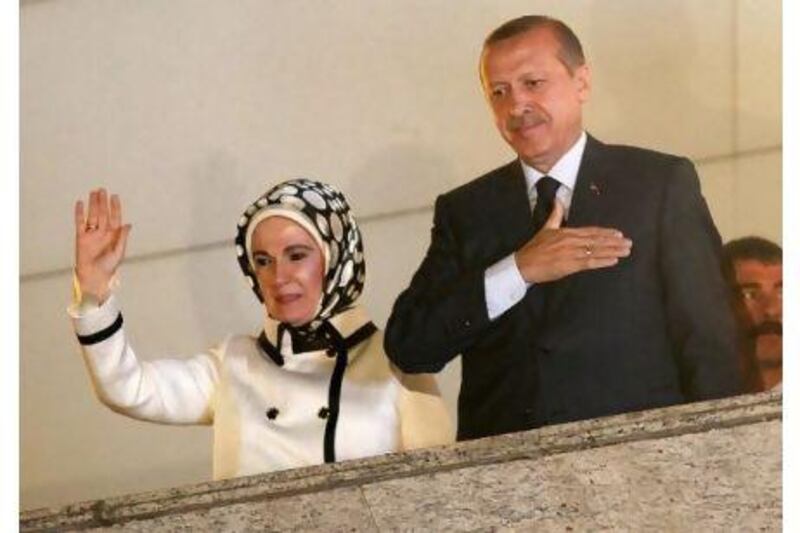ISTANBUL // Turkey's elections. which balanced a stable government with a requirement for politicians to forge a broad agreement for a new constitution, have strengthened the country's role as a political model with a functioning Muslim democracy, analysts say.
The religiously conservative Justice and Development Party (AKP) of Recep Tayyip Erdogan, the prime minister, scored a record 49.9 per cent of the vote in Sunday's parliamentary elections to win its third straight term in power. The AKP raked in almost twice as many votes as the second party, the secularist Republican People's Party (CHP) which came in at 25.9 per cent.
Video: Erdogan wins parliamentary elections
Last Updated: June 14, 2011 UAE
Despite the resounding AKP triumph, voters rejected Mr Erdogan's plea to give the party the two-thirds majority in parliament needed to exclusively alter the constitution. With 326 seats in the 550 seat assembly in Ankara, the AKP will have to seek agreement with other parties if it wants to carry out its promise of a new constitution, replacing one written under orders by the military in 1982 after a coup d'etat.
Mr Erdogan left no doubt that he thinks the election outcome has strengthened Turkey's role in the region.
"Believe me, tonight Sarajevo has won as much as Istanbul has," Mr Erdogan said in his victory speech to thousands of cheering supporters who had gathered in front of the AKP headquarters in Ankara late Sunday.
"Beirut has won just as much as Izmir has, the West Bank and Gaza have won just as much as Diyarbakir has. Tonight, the Middle East, the Balkans and the Caucasus have won just as much as Turkey has.
"We will become much more active in regional and global affairs," Mr Erdogan said.
Turkey, a Western-style democracy with a Muslim population, has been described as a model state for countries caught up in the uprisings of the Arab Spring. The outcome of the election has boosted that function, political analyst Celalettin Yavuz said.
Mr Yavuz, the deputy director of the Centre for International Relations and Strategic Analysis, or Turksam, a think tank in Ankara, said in an interview yesterday: "After the election, Erdogan is more powerful [in the region] than he was before."
People in the Middle East saw Mr Erdogan "as a leader of a Muslim, but democratic state," something demonstrators around the region want for their own countries, Mr Yavuz said.
Veysel Ayhan, an analyst at the Centre for Middle Eastern Strategic Studies, or Orsam, another think tank in Ankara, said the Turkish election result carried an important message for both the people and the governments in the region: "You can be successful if you are close to the people," Mr Ayhan said.
He also pointed to protests outside the Turkish embassy in Damascus late Sunday, which showed that authoritarian regimes in the region were not happy with the effectiveness of the democratic process in Turkey, he said. About 2,000 supporters of the Syrian regime gathered in front of the Turkish embassy in the capital and tried to take down the Turkish flag, news reports said.
In Ankara, the issue of the new constitution has dominated from the moment Mr Erdogan's victory became clear. The prime minister, who has been accused of autocratic tendencies, said he would work with the opposition and pledged to protect the rights and the lifestyle of all Turks, not just of the predominantly conservative circles that voted for him.
"The nation has given us the message that the new constitution should be created through agreement and negotiation," Mr Erdogan said in his victory speech. "We will go to the opposition. We will look for consultation and agreement with the media and academics. We will not close our doors."
He also stressed that the AKP, supported by many observant Muslims but despised by many Turkish secularists, would form a government that was respectful to everyone in the country.
"No one should have doubts that [protecting] the lifestyle, faith and values of both those who voted and did not vote for us will be a matter of honour for me," Mr Erdogan said.
Leaders of Turkey's business community called on politicians to resolve their differences and get to work on the new constitution. Parties should act quickly, Haci Boydak, a leading industrialist, told Zaman, a newspaper close to the government.
Political observers said the election had given Mr Erdogan, whose government spent years trying to strip the once-powerful military of its political influence, a good chance to seek a compromise with the opposition.
Four years ago, the AKP victory in the elections came after the military threatened to stage a coup against Mr Erdogan, but today, "there are no more excuses" for the ruling party, Rusen Cakir, a television and newspaper commentator, told the NTV news channel.
Others agreed. "We have a level playing field now," columnist Mumtaz'er Turkone wrote in yesterday's Zaman. "A new constitution is possible at last."






